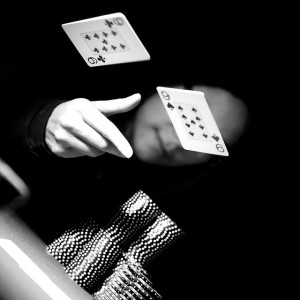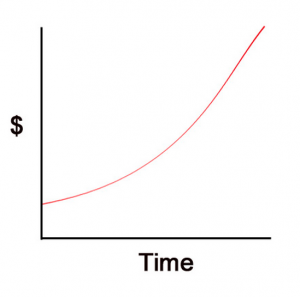What is the appeal of poker?
Some say it’s the gambling aspect. The thrill of putting your money in the pot with an uncertain of outcome, the adrenaline rush of winning and losing money at the turn of a card and the thought of hitting some big hands and leaving the table a big winner. Others would argue that it is the appeal of the game itself. The idea of trying to outwit your opponent, the puzzle solving element and trying to make the best possible decision with incomplete information. Your answer to this question will depend on who you are, because different people are attracted to poker for different reasons. Some are attracted to the gambling aspect of poker, while some are lured by the gaming element. These two groups of people can loosely be described as ‘gamblers’ and ‘gamers’.
Gamblers and gamers usually come from different backgrounds. The division may even go back to the ‘jock’ and ‘nerd’ division at school. The jocks have guts, take risks and live on the edge. The nerds are conservative, analytical and don’t take unnecessary risks. In more recent history, gamblers will almost certainly have participated in other forms of gambling, such as sports betting, roulette or blackjack. Gamers on the other hand are more likely to have discovered poker through other games of skill. Many are former chess or backgammon players and recently Magic: The Gathering players have started to hit the poker table in droves.
But who is are more likely to succeed? Is it better to be a gambler or a gamer? In fact, both have plenty to bring to the poker table. In this article we will be looking at the scenarios in which each type of player will thrive and the areas in which they are likely to struggle. I imagine that there are both gamblers and gamers reading this article and hopefully it will help you to identify some of your strengths and weaknesses.
The Gambler at the Poker Table
A gambler would be attracted to poker because of the thrill of winning or losing money at the turn of a card. They will instinctively seek out situations where their fortunes will be dictated by the laws of chance. Note that this doesn’t necessarily make them a bad player. Many gamblers can fulfil their desire to gamble by playing a good game of poker. As we all know, even playing winning poker is gambling, at least in so far as the outcome is uncertain in the short-term. There is no reason that somebody who is a gambler by nature would not be able to overcome their desire to ‘gamble it up’ and be able to play solid, disciplined poker.
However, there are two areas where a gambler may struggle to make the optimal plays. The first and most obvious is situations where optimal play calls for the player not to gamble and instead choose the safer option (usually folding). We’re not talking about decisions that are clear-cut. While gamblers like to gamble, they can usually override this instinct if they can see that a particular gamble is futile. However, if the decision is close, then an affinity for gambling can tip the scales in favour of the speculative play. They may err on the side of the slightly reckless call, bluff or all-in rather than the prudent fold or check behind.
The second area where a gambler may stray is bankroll management. Sound bankroll management in many ways takes the gamble out of poker. For gamers this is its virtue, but for gamblers it detracts from the game. Losing $1,000 doesn’t mean as much if your bankroll is $10,000, but then again neither does winning $1,000. If a gambler already has $10,000 then they would rather take their chances trying to win a larger amount (which goes some way to explaining the popularity of multi-table tournaments with big top prizes). True gamblers want to play at the highest stakes they can afford. Many practice good bankroll management, but only because they have the foresight to realise that they will go broke otherwise.
The advantage that gamblers have is that they are good at making the tough decisions. A gambler won’t be afraid to make the tough calls and the big plays when the situation warrants it. As the saying goes, ‘scared money can’t win’ and a gambler rarely plays scared. In high-pressure situations, such as late in big tournaments, a gambler should be able to keep a cool head and make the best decision more easily than a gamer.
The Gamer at the Poker Table
A gamer is attracted to poker for the same reason they are attracted to any other game; the mechanics of the game, the competition and the ‘fun’ element. The may also be attracted by the prospect of winning money, but it will strictly be winning money that interests them, not gambling it or the possibility of losing. Gamers have the advantage that they play to win. That is not saying that they always play well, but if they play badly it is usually because they don’t know any better and not, like gamblers, that they have other motives driving them to play in a sub-optimal way.
Gamers are good problem solvers at the table. They are keen to find the best play in any given situation. They generally see their betting decision as a means to an end, rather than an end in itself. For example, when they go ‘all in’ it’s because they hope that their opponent will call with a worse hand or fold a better one, not because they enjoy the buzz of pushing all their chips into the middle. Obviously this is a far better reason to make a decision and an attitude far more likely to yield better results.
This should, in theory, give gamers a decisive advantage over gamblers at the poker table. Unfortunately, gamers have many hidden enemies, which they are often ill-equipped to deal with. The biggest of these enemies is variance. For a gambler it is variance that makes poker interesting (whether they admit it or not), but for a gamer it is the enemy. Variance regularly punishes correct plays and rewards bad ones. Variance ensures that the best player doesn’t always win and that bad players will often walk away with all the chips. Variance will allow the best player in the world to go broke if they don’t manage their bankroll properly. In poker there are very few certainties, only percentages. When gamers suffer bad beats and downswings, they tend to cope badly with them. This wasn’t what they signed up to poker for!
Gamers can also have problems when they move up to higher limits. They start to feel uncomfortable when they are gambling with meaningful sums of money, unlike gamblers who crave such action. They might start to play scared, acting in a risk-averse manner. In fact, there is probably a cap on the limits that most gamers can play successfully. Beyond a certain level they might simply be unable to handle the nominal cash amounts involved.
Which is better?
Unfortunately, we can’t really say whether it is better to be a gamer or a gambler. Gamers will tend to thrive in situations where they can make clear and rational decisions and are playing well within their comfort zone. Gamblers will thrive when there is a big decision to be made, a lot of money on the line, or when the situation favours a bold, possibly counter-intuitive approach. You might say that gamers will be more successful in cash games and gamblers in tournaments. Or that gamers will be more successful at low limits and gamblers at high limits. Unfortunately both of these are over-simplifying what is a complex issue.
The truth is that both gamblers and gamers can be successful poker players. Gamblers must learn to suppress their wild tendencies, while gamers must learn to handle variance and remodel their ideals of winning and losing. However, if you really want to reach the upper echelons of the game, then you probably need some of each. Somewhere inside, you will need a little gambler and a little gamer to guide you.
Ian Taylor, AKA “Piemaster is the Co-Author of the highly regarded Poker Psychology Book “The Poker Mindset”.
Submit your review | |









